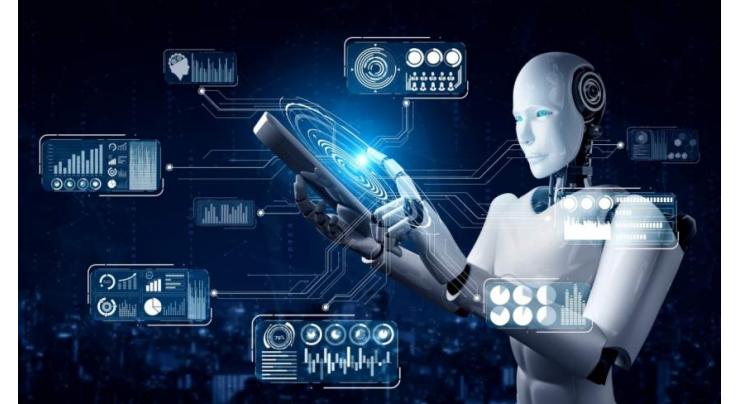
AI To Be Inevitable Trend In Developing Countries
Daniyal Sohail Published June 27, 2023 | 10:58 PM

Technology continues to surpass our wildest imaginations with advances such as artificial intelligence, big data and the metaverse
BEIJING, (UrduPoint / Pakistan Point News - 27th Jun, 2023 ):Technology continues to surpass our wildest imaginations with advances such as artificial intelligence, big data and the metaverse.
Artificial intelligence is creating a huge potential to develop in developing countries.
According to Mrs. Yajie Hao, director of Qingbo Metaverse Laboratory, there are no more than five companies making humanoid robots in China.
Humanoid robots incorporate advanced technologies such as high-performance servo driver and control software systems, motion control algorithms, and vision algorithms, among others. With a machine-muscle ratio of more than 50%, they can mimic most human facial movements.
The production of a humanoid robot typically takes 20 days or longer, depending on its capabilities, CEN reported on Tuesday.
Many humanoid robots can now perform a variety of actions, such as pouring coffee or water, providing assistance as a bank guide, and displaying a variety of clothing for customers.
As for the core technology on them, humanoid robots in China have gone beyond already top high-tech enterprises in the world today. Said Wang Lei, general manager of Qingbao Robot. And even more advanced than a Tesla Bot.
Wang cited the example of Tesla, which has 40 rotational angles on a single Tesla Bot. With comparison, our humanoid robots have 52 rotatable angles, which means our robots are more flexible. Wang Lei explained.
Independently researching and developing control systems and core elements on a single robot is also a great advantage in terms of production costs for domestic humanoid robots. Now we have received many purchase intentions from neighboring countries, Wang added.
According to Wang, AI in developing countries will form a blue ocean and become an inevitable trend in social development.
As for humanoid robots, the more delicate the work, the more difficult, and thus the higher the requirements for the robot hand.
For some developing countries, the restoration of human hands after the war is a big issue. Now with robot arms and hands, ordinary people can regain convenience and dignified life. Wang noted that their team has now applied to the Shanghai Federation of Disabled People for the application of the robotic hand.
In agriculture, the flexible arms and dexterous hands of humanoid robots, combined with robotic vision systems, can perform very detailed tasks such as picking tea leaves and grapes. And, unlike humans, who cannot work all the time and need to rest, eat and drink, robotic pickers are extremely efficient and can work non-stop 24 hours a day. In this way, a robot can do six times the work of a human per day.
In the energy sector, some jobs are in high-temperature, high-pressure and high-risk environments such as thermal power generation and nuclear power plants. Humanoid robots have strong resistance to risky environments and can continuously, thus they can be competent in harsh working environments.
Wang Lei explained. Developing countries also need to maximize production efficiency, and human life is vitally important. In the risky scenario of energy, we also need to cherish life and replace humans with robots.
Wang gave an optimistic outlook on intelligent robots.
Related Topics
Recent Stories

PTI founder acquitted in May 9 vandalism case

Liverpool confirm Slot will replace Klopp as manager

Russian playwright & director on trial for 'justifying' terrorism

Free media, responsible opposition play crucial roles in national development: S ..

AJK leaders condolence Iranian President's demise in helicopter crash

Schauffele birdies final hole to capture PGA for first major win

Police arrest two persons in murder case

ICC seeks arrest warrants for Israeli PM, defence minister and Hamas leaders

Business community condole tragic death of Iranian President

Murad Baloch calls on Governor Balochistan

City faces heatwave, temperature soars to 43.7°C

Bhai Khan Welfare association setup heat stroke centre
More Stories From Technology
-

TECNO Raises the Bar: 3 Years of Security and Patch Updates Guaranteed for the Camon30 Series
11 hours ago -

Vivo V30e 5G Coming Soon in Pakistan to Elevate Your Life Experience with Elegant Design and Portrai ..
3 days ago -

Realme's Commitment to Quality and Innovation: A Look at Q1 2024
3 days ago -

OPPO A60: Ultimate Durability and Strength – Your Most Reliable Partner
3 days ago -

Participate in #Y100YSoCool Contest and Get a Chance to Win All-New vivo Y100
4 days ago -

“Get your OPPO A60 Today: Pre-order Your Most Reliable Partner”
7 days ago
-

TECNO answers to his Fans!! Price Drop to 55K?
12 days ago -

Edotco Delegation Visits PTA
12 days ago -
Over 14,000 Livestock Department employees’ profiles digitized via PITB developed Human Resource M ..
12 days ago -

50MP is Better than 200MP?
12 days ago -

"The New realme Note 50 Breaks Sales Records for The Month of April”
14 days ago -

Vivo Y100 is Now Available in Pakistan with Color Changing Design & 80W FlashCharge
14 days ago










